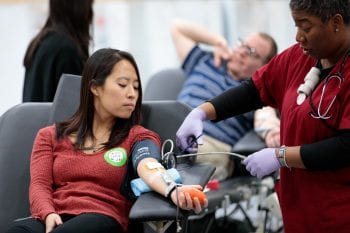Jennifer Greenberg ’18 (left) knows that donating blood doesn’t always feel like an urgent responsibility. “When people think about giving blood, they don’t necessarily think, ‘I’m going to save a particular person’s life,'” she said. However, as a member of the Blood Drive Leadership Team and a recipient of a blood transfusion herself, Jennifer realizes just how vital a stable blood supply is for many people. Recognizing the wide variety of individuals that the blood bank serves, from disaster victims to those suffering from illnesses, she urges people to “be attentive to when blood drives are happening, and give when they can, because somebody has to keep supplying the blood banks.”
Jennifer’s personal experience as a recipient of blood transfusions informs her passion for supporting blood drives on campus. She had leukemia when she was very young and was severely anemic as a result, necessitating two blood transfusions. “That’s basically all I know. I needed blood and I got it.” The fact that it was such an easy process is testament to the importance of a stable blood supply. “I can say that if there hadn’t been enough blood in the bank, I wouldn’t have been able to get the help I needed.”
According to the American Red Cross, 38 percent of the U.S. population is eligible to donate blood, but less than 10 percent of that population actually does so each year. Jennifer said, “It’s important to know if you’re eligible. Because so many people aren’t, if you’re eligible, aware, and willing to donate, you could have a tremendous impact. If you can give blood, be a role model and be proud of your donation. It could encourage others to give as well.” For the large number of people who cannot donate, however, there are many other ways to get involved. Jennifer suggested that a powerful and easy way to contribute is to “use your voice and social influence to let people know when drives are going on and help out by promoting them.” Joining the Blood Drive Leadership Team is another way for students to support blood donation. “There’s a lot of room for creativity on the team in the way that we promote drives and engage people.”
Jennifer’s advice to someone considering donating blood is to “be conscious of when drives are happening and make sure you donate. Be sure to stay healthy, eat the right foods, and keep your iron high. And tell your friends!”
Every year, WashU’s University-Wide Blood Drives, sponsored in partnership with the American Red Cross and Mississippi Valley Regional Blood Center, collect over 1,500 total units of blood. The most recent blood drive on April 4 was a success with a total of 355 units donated, a 24 unit increase from last year’s April blood drive. The next university blood drives will be held on June 19 and June 27. Sign up for and keep track of on-campus blood drives here.

